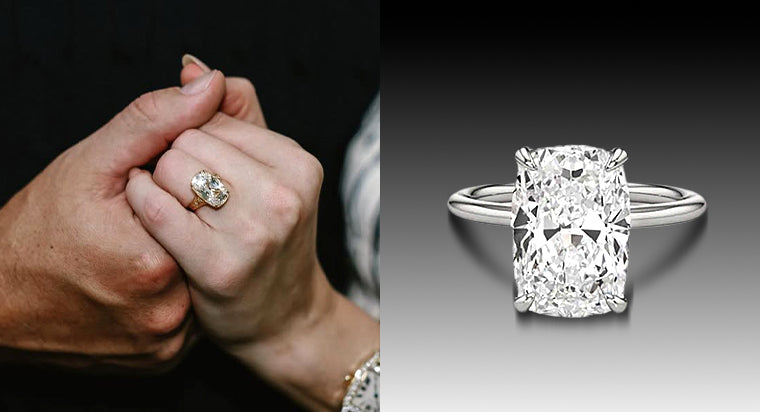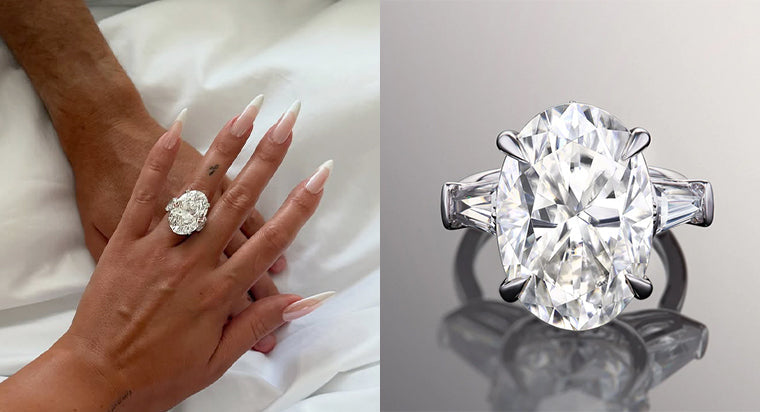Choosing the Perfect Metal for Your Engagement Ring: Silver, Gold, or Platinum?

When it comes to selecting an engagement ring, we often focus on the diamond or gemstone, the design, and the setting. However, the choice of metal is equally vital, as it greatly influences the appearance and durability of your ring. In this article, we will explore the pros and cons of three popular metal options: silver, gold, and platinum. By decoding each metal, you can make an informed decision that best suits your preferences and lifestyle.
TABLE OF CONTENTS
Popular Metal Options
When it comes to engagement rings, silver, gold, and platinum are among the most-loved metal options. Each metal has its own unique characteristics and appeal. However, it's important to understand the pros and cons of each metal before making a decision.
Silver
Silver is a classic choice for jewelry, known for its affordability and lustrous appearance. It offers a timeless and elegant look, making it a popular choice for engagement rings. However, silver is a relatively soft metal, prone to scratches and tarnishing over time. This means it may require more frequent maintenance and polishing compared to other metals. On the positive side, silver can be easily resized or repaired, making it a flexible option.
Gold
Gold has been cherished for centuries and is available in various shades, including yellow, white, and rose gold. Its versatility allows for a wide range of designs, making it a preferred choice for engagement rings. Gold is naturally resistant to rust and corrosion, ensuring long-lasting beauty. However, pure gold (24k) is too soft for everyday wear, so it is alloyed with other metals to enhance its durability. Commonly used alloys include copper, silver, nickel, and zinc.
-
14k Gold
With a higher proportion of alloyed metals, 14k gold is more durable than its 18k counterpart. It strikes a balance between durability and purity, making it suitable for everyday wear. Additionally, it offers a range of colors and is less prone to scratches and dents compared to higher karat gold.
-
18k Gold
18k gold contains a higher percentage of pure gold, making it softer but more valuable. While it offers a rich color and is ideal for intricate designs, it may be less resistant to everyday wear and tear. Therefore, it is recommended for special occasion jewelry rather than everyday wear.
Platinum
Platinum is renowned for its rarity, durability, and stunning silvery-white appearance. It is one of the strongest metals used in jewelry, making it highly resistant to scratches and damage. Its density adds weight to the ring, providing a luxurious feel. Platinum is naturally hypoallergenic, making it an excellent choice for individuals with sensitive skin. However, platinum is more expensive than other metals due to its scarcity and labor-intensive production process. Additionally, it may develop a natural patina over time, which some people find appealing, while others prefer the original high-polish look. If desired, platinum can be easily restored to its original shine through professional polishing
Verdict
Choosing the best metal for your engagement ring depends on your personal preferences, lifestyle, and budget. If you prioritize affordability and appreciate a classic look, silver can be a suitable choice. On the other hand, if you desire a versatile metal with different color options and durability, gold, especially 14k gold, is an excellent option. Gold offers a timeless appeal and can withstand everyday wear with proper care. For those seeking the ultimate symbol of luxury and durability, platinum offers a prestigious choice but at a higher price point. Platinum is an ideal choice for individuals with sensitive skin and those who prefer a heavier feel to their rings.
FAQs
Is 14k or 18k gold better for an engagement ring?
Both 14k and 18k gold have their advantages. 14k gold is more durable and suitable for everyday wear, while 18k gold contains a higher percentage of pure gold, offering a richer color and is ideal for intricate designs. Consider your lifestyle and preferences to make the best choice.
Is white gold hypoallergenic?
White gold is not naturally hypoallergenic. It is usually alloyed with other metals such as nickel, which can cause allergic reactions in some individuals. However, there are hypoallergenic options available, such as palladium-based white gold or white gold alloyed with other hypoallergenic metals like platinum or silver. Opt for these alternatives if you have sensitivities.
Does platinum require regular maintenance?
Platinum is a low-maintenance metal. It is highly resistant to scratches and corrosion, which means it retains its beauty without frequent maintenance. However, over time, platinum may develop a natural patina, adding character to the ring. If you prefer the original high-polish look, periodic professional polishing can restore its shine.
How many times does white gold require re-plating?
The frequency of white gold re-plating depends on various factors, including the thickness of the rhodium plating, how often the ring is worn, and personal care habits. Generally, white gold rings may require re-plating every 1-3 years to maintain their bright, white appearance. Regular cleaning and gentle handling can help prolong the time between re-plating.









